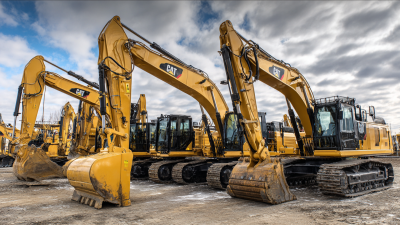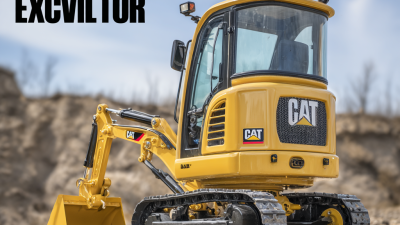Leave Your Message
- Phone
- E-mail
- Whatsapp
 In today's competitive job market, the role of a Heavy Machine Operator has evolved significantly,
demanding a diverse set of skills that go beyond mere mechanical operation. As industries continue to integrate advanced technologies
and automated systems, aspiring operators must equip themselves with both technical expertise and soft skills to thrive.
This article will explore the essential skills that every Heavy Machine Operator should cultivate, ranging from
mechanical proficiency and safety awareness to effective communication and problem-solving abilities.
By understanding and honing these critical competencies, operators will not only enhance their employability but also contribute
to the overall efficiency and safety of heavy machinery operations. Whether you're a seasoned professional or just starting in this field,
mastering these essential skills is key to succeeding in the ever-changing landscape of heavy machinery operation.
In today's competitive job market, the role of a Heavy Machine Operator has evolved significantly,
demanding a diverse set of skills that go beyond mere mechanical operation. As industries continue to integrate advanced technologies
and automated systems, aspiring operators must equip themselves with both technical expertise and soft skills to thrive.
This article will explore the essential skills that every Heavy Machine Operator should cultivate, ranging from
mechanical proficiency and safety awareness to effective communication and problem-solving abilities.
By understanding and honing these critical competencies, operators will not only enhance their employability but also contribute
to the overall efficiency and safety of heavy machinery operations. Whether you're a seasoned professional or just starting in this field,
mastering these essential skills is key to succeeding in the ever-changing landscape of heavy machinery operation.
In today's competitive job market, possessing essential heavy machine operation skills is vital for industry success. According to a report by the Bureau of Labor Statistics, the demand for heavy equipment operators is projected to grow by 10% from 2020 to 2030. This reflects the increasing reliance on skilled operators for various sectors, including construction, mining, and agriculture, where precision and safety are paramount.
To thrive in this environment, operators must master key competencies such as equipment proficiency, safety procedures, and maintenance knowledge. A survey by the National Center for Construction Education and Research indicated that 72% of employers prioritize candidates with formal training and certifications. Thus, investing in education and hands-on training can greatly enhance job prospects.

In today's competitive job market, certifications in heavy machinery operation play a crucial role in the employability of operators. According to the Bureau of Labor Statistics, the demand for construction equipment operators is expected to grow by 10% from 2020 to 2030, which translates to over 36,000 new jobs. However, employers often prioritize candidates who possess recognized certifications, as these credentials provide assurance of an operator's skills and safety knowledge.
Certifications such as those offered by the National Center for Construction Education and Research (NCCER) can enhance an operator's proficiency in handling various machinery, from excavators to bulldozers. Data from a recent industry survey indicates that certified operators earn, on average, 15% more than their non-certified counterparts. Furthermore, many states and companies are increasingly mandating specific certifications to comply with safety regulations, thereby making these credentials essential for anyone seeking long-term success in the field of heavy machine operation. Ensuring that one is certified not only boosts employment prospects but also fosters a safer working environment for all.
This bar chart illustrates the key skills required for heavy machine operators to thrive in today's job market, along with the importance of certifications in each skill area. The data reflects the increasing demand for specific skills in the industry.
In today's job market, heavy machine operators must possess a specific set of technical skills to thrive. One of the most crucial abilities is proficiency in operating various types of machinery, such as excavators, bulldozers, and cranes. This not only includes understanding the controls and functions of the equipment but also the ability to perform routine maintenance checks to ensure safety and efficiency on the job site. Familiarity with industry-standard tools and equipment enhances an operator's versatility, making them more attractive to employers who require adaptability across different project needs.
Moreover, heavy machine operators should have a solid grasp of blueprints and maps to execute projects correctly. This skill allows operators to interpret plans, understand measurements, and visualize the work required in context, ensuring precision in their operations. Additionally, knowledge of current safety regulations and protocols is essential, as it directly impacts not only the operator's safety but also the safety of their crew. Maintaining compliance with OSHA regulations and attending regular safety training sessions is vital in minimizing risks associated with heavy machinery operation. Such expertise positions operators as competent professionals in a competitive field.

Navigating safety regulations is a critical aspect for heavy equipment operators in today’s job market. The complexity of modern construction sites demands that operators not only possess technical skills but also adhere to strict safety protocols. Familiarity with safety regulations ensures that operators can work efficiently while minimizing risks to themselves and their colleagues. This knowledge includes understanding OSHA standards, recognizing potential hazards, and knowing how to respond effectively in emergency situations.
Moreover, compliance with safety regulations often leads to enhanced career opportunities. Operators who demonstrate a strong commitment to safety can distinguish themselves, making them more attractive to employers who prioritize a culture of safety on the job site. Regular training sessions and certifications in safety practices are essential for staying updated with the latest regulations. By actively engaging in safety programs and promoting best practices, heavy equipment operators can contribute to safer working environments while also enhancing their own professional profiles in a competitive job market.
In today's rapidly evolving job market, heavy machine operators must adapt to technological advances to remain competitive. The integration of automation and smart technology into heavy machinery has transformed the industry, requiring operators to be well-versed in new operating systems and tools. According to the Bureau of Labor Statistics, employment for heavy equipment operators is projected to grow by 10% from 2022 to 2032, underscoring the importance of technical proficiency in this field.
To thrive amid these changes, operators should focus on honing their technical skills. Familiarity with computer-aided design (CAD) software and advanced machinery controls is increasingly vital. Furthermore, operators can benefit from engaging in continuous education and certification programs that enhance their understanding of emerging technologies. Programming knowledge related to machine operating systems can significantly boost an operator's employability in a tech-centric environment.
**Tips:** Stay updated with industry trends by attending workshops and training sessions. Networking with professionals in the field can provide insights into the latest technological advancements. Additionally, consider seeking certification in specialized machinery to broaden your expertise and appeal to potential employers.






